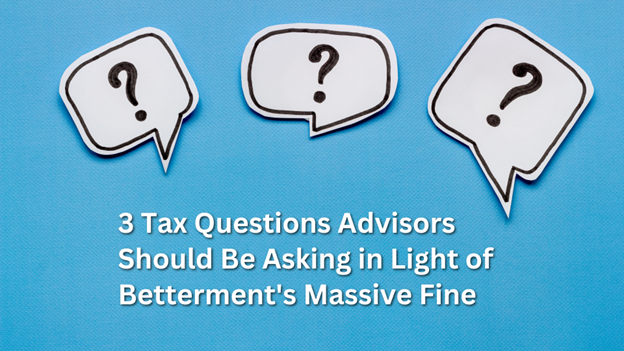One of the biggest added values you can bring your clients as a financial advisor is helping them with tax complexity; that is, helping your clients reduce their tax burden now and in the future.
But there are risks in making promises to clients about how you, as a financial advisor, can help them with their tax situation. Look no further than Betterment. The robo advisor was fined $9 million in April by the SEC for misstatements regarding its concerning tax-harvesting service.
Your advisory firm may not have $32 billion in assets under management like Betterment. And you may feel that being a real advisor and not a robo-advisor makes you far less likely to wind up in a similar situation. So why is Betterment’s story and, more importantly, this massive fine relevant to advisors?
Well, Betterment’s hefty financial repercussions serve as an important reminder for financial advisors about the risks inherent when dealing with taxes. From a personal tax standpoint, we are all well aware of the possibilities of potential audits and fines resulting from mistakes on your returns. Dealing with taxes as a business raises that bar to another level. You’re not only risking potential legal and financial ramifications for tax mistakes, but you’re risking that for clients and their families. Your firm will suffer a multitude of consequences, but there’s a strong chance those consequences won’t be just your firm’s problem. They will become someone else’s problem too.
So, in light of Betterment’s situation, now is a good time to take a step back from how your firm approaches taxes, assess your risks, and make sure you don’t wind up in a similar predicament. Whether you handle taxes internally, work with a local tax firm, or partner with a firm like The Walters Institute, here are three questions you should be asking your advisory firm.
Is Your Advisory Firm Avoiding Tax Pitfalls That Could Jeopardize Your Client Relationships?
The last 18 months in the markets have reinforced the importance of bringing more to the table for clients than just strong returns in their portfolios. Tumultuous market conditions put many clients on edge and may lead to them terminating their relationship with their advisor.
Another common scenario that can quickly sour a client relationship? Having to call them and explain that their tax bill is painfully high and it’s your fault. We partner with a lot of advisors on tax strategies and—trust us—we’ve heard quite a few horror stories along the lines of large tax bills. Can you blame those clients? Wouldn’t you do the same thing if the person who’s supposed to be growing your investments tells you that you owe tens of thousands of dollars more in taxes than you were expecting?
This brings us back to the core question on this topic. Are you avoiding the tax pitfalls that could jeopardize your client relationships? We’d hope your answer isn’t no. But if you’re unsure if you’re avoiding common tax pitfalls, it may be time to consider looking for a more reliable source than posting your tax questions in a Facebook group or searching for answers on Google. If you’re part of any Facebook group for financial advisors, then you know firsthand that most questions and conversations revolve around taxes. And more often than not, you’ll receive conflicting advice that leaves you even more confused.
Considering Betterment’s fine, there may be a strong motivator—or at least we’d hope so—to ensure you’re avoiding common tax pitfalls.
Are You Maximizing Your Client’s Tax Situation to Their Benefit?
This goes hand in hand with the previous point. The inverse of jeopardizing client relationships with common tax hazards is strengthening client relationships by maximizing their tax situation.
Borrowing our example from earlier, wouldn’t it be great if, instead of having to make a dreaded phone call about a tax bill, you had the opportunity to share a giant tax savings result with your client?
As we stated earlier, tax mitigation strategies are often one of the biggest value-adds in your arsenal as a financial planner. That’s particularly true when you’re in the realm of serving high-net-worth clients, as is the case with many of the advisors The Walters Institute partners with. That’s because tax planning is one of the biggest needs for high-net-worth families and individuals. They’re not concerned with running out of money in retirement. They’re worried that their money isn’t being put to work in the most effective way possible.
Regardless of whom you serve as an advisor, are you addressing that concern? Do you have the tools to make sure you’re maximizing how your clients’ money is working for them?
Betterment overpromised on their tax strategies to land their fine. And in doing so, the clients who thought they’d be maximizing their money through those tax strategies weren’t, in fact, hitting that perceived goal.
Even if you’re not currently equipped to deal with advanced tax planning, this story should serve as a reminder to facilitate discussions with your clients about the benefits of working with an advisor outside of managing their portfolio.
Does Your Firm Review Tax Strategies with a Trusted Partner?
We all make mistakes. Some are small, and some are big, leading to fines or other punitive action from regulators like the SEC. But many of these mistakes we’ve discussed in this piece are avoidable. That’s where having a trusted tax partner comes into play.
We’ve all sat in front of a screen staring at the same line of our own writing on a Word document, squinting to see if we can pick out any spelling or grammatical mistakes. You may come back to that same document after a few hours or a few days and see a glaring error. And you wonder how you could’ve missed it the first time through.
The fact is that we all have blind spots. It’s hard to find grammar mistakes when we’re the ones who wrote something. Passing that same document on to someone else is a far more efficient way to edit to catch those errors. (In fact, this article was reviewed by several people on our team. Let’s hope we caught everything!) And with something as important and costly as taxes, it’s even more important to have a second set of eyes.
So that begs the question: are you and your firm using a tax partner currently? Maybe you’re fortunate enough to have a tax guru or CPA in-house. But oftentimes we speak with advisors who, like the previous example, are expecting to vet and double-check their recommendations on their own. Not only is that potentially very inefficient, but again, it could be very costly if you don’t catch mistakes.
Why Are These Questions So Important?
To put all these questions together, it’s clear that tax planning is an important part of financial planning. It’s important enough that even a robo advisor tried (and failed) to deliver tax strategies to its clients. As a result of that failure, Betterment incurred a substantial fine. If a firm with billions of dollars under management is susceptible to such a large fine, it is incumbent on advisors to be asking these core questions about their own practices so that they can avoid a similar situation.
About Heath & The Walters Institute
Heath Walters is a strategic tax planning specialist who partners with financial planners to provide behind-the-scenes tax planning expertise for the high-net-worth clients of financial planning firms. With over 20 years of experience as a CPA and Certified Tax Coach, Heath helps financial planning firms set themselves apart to ideal clients through coaching and specialized services that complement traditional wealth management solutions. Heath’s proven process for client acquisition has led to many advisors doubling their book of business in as little as 24 months. Heath has both a bachelor’s degree in accounting and Master of Science in Accounting from Appalachian State University. When he’s not helping financial planners reach their firm’s goals, you can find him spending time with his wife, Nancy, and their three children, Allie, Brianna, and Cooper, or fishing, grilling, and tackling home remodeling projects. He’s an avid Roll Tide fan as well. To learn more about Heath, connect with him on LinkedIn.




